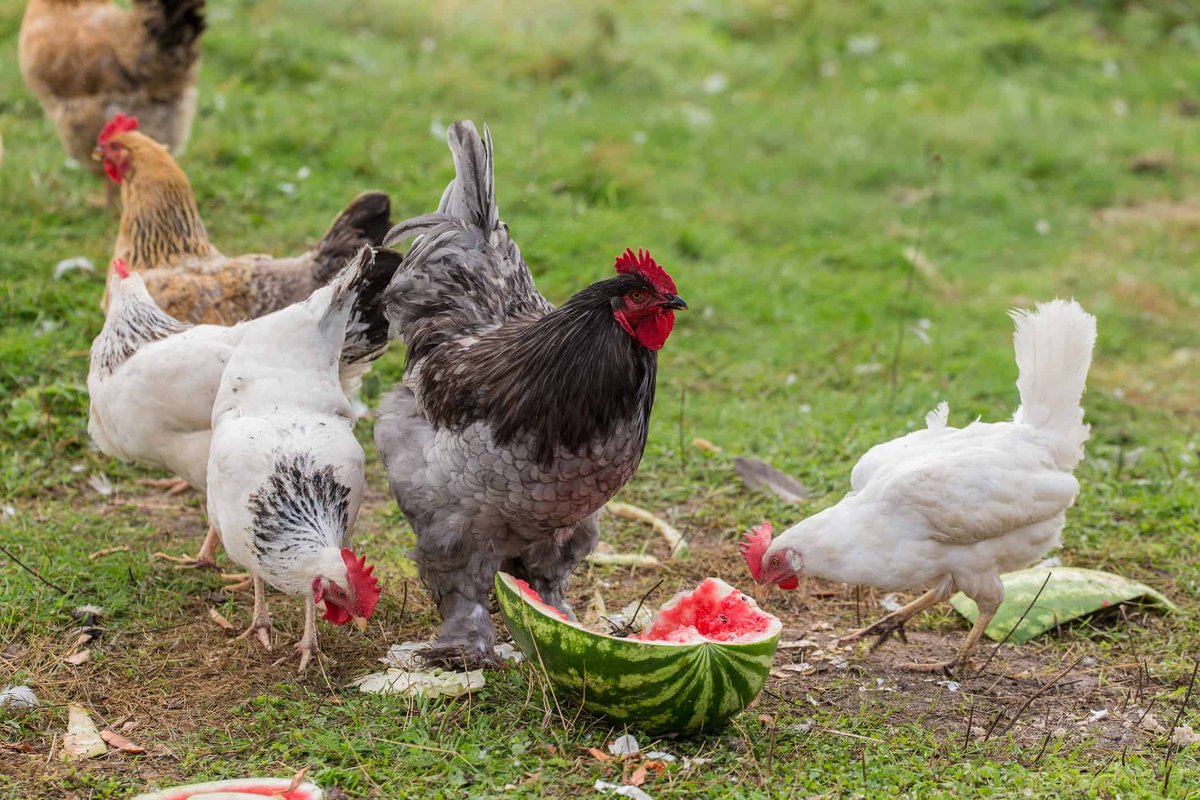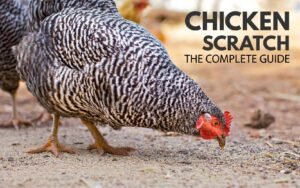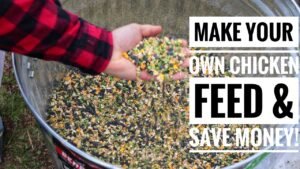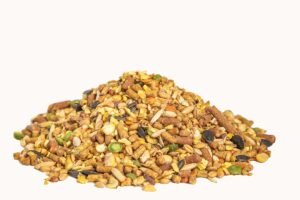Watching your flock peck around the yard, it’s tempting to share a tasty snack from your kitchen. But what’s a healthy treat and what’s potentially harmful? This guide provides clear, definitive answers on whether chickens can eat watermelon, tomatoes, and bananas, along with a comprehensive reference for many other common fruits and vegetables. By the end, you’ll know exactly what you can safely share from your kitchen to provide a varied and nutritious diet for your chickens.
The Golden Rule of Chicken Treats: Moderation and Purpose
While it’s fun to share food with your flock, treats should only ever make up about 10% of a chicken’s diet. Their primary food source must always be a nutritionally balanced chicken feed, as it provides the essential protein, vitamins, and minerals they need for good health and consistent egg production. Treats are meant to be a supplement, not a replacement. A good rule of thumb is to give them about a handful per bird, a few times a week. Overfeeding treats can lead to weight gain, reduced egg production, or even digestive issues like sour crop.
Knowing what foods are safe is the first step, but understanding the right quantity and frequency is what truly keeps your flock thriving. So, let’s dive into some of the most popular treat options.
Can Chickens Eat Watermelon? (The Hydration Hero)
Yes, watermelon is an excellent and safe treat for chickens, especially on hot days. It’s a fantastic way to provide hydration and a welcome source of enrichment.
Why Watermelon Is So Good for Chickens
Watermelon is packed with beneficial nutrients like vitamins A and C, which are great for your flock’s immune system. More importantly, its high water content makes it a perfect way to help your chickens stay cool and hydrated during warm weather, which is especially important as a lack of water can cause a hen to stop laying eggs. The fruit also contains essential minerals like potassium and magnesium that support muscle function.
How to Serve Watermelon
Chickens can eat the red flesh, the green rind, and even the seeds. Simply cut it into large chunks and let them have at it—they’ll happily peck it down to the rind. For extra fun on a hot day, you can freeze watermelon chunks or halves to create a refreshing “chicken popsicle.” Just be sure to only feed them fresh, ripe watermelon and never anything that looks spoiled or moldy.
Now that you know the ins and outs of serving this summer favorite, let’s explore another garden staple: the tomato.
Can Chickens Eat Tomatoes? (The Ripe Rule)
Yes, chickens can safely eat ripe red tomatoes, but you must never feed them unripe green tomatoes or any part of the tomato plant itself.
The Safe Part (Ripe Tomatoes)
Ripe tomatoes are a safe, healthy snack that provides beneficial nutrients and antioxidants like lycopene. The skin and seeds of ripe tomatoes are perfectly safe for chickens to eat and are easily digestible.
The DANGEROUS Part (The Plant & Unripe Fruit)
The tomato plant, including the stems, leaves, and unripe green fruit, contains a toxin called solanine. This is a defense mechanism for plants in the nightshade family and can be harmful to chickens, causing digestive upset, lethargy, or other serious health issues. Always stick to ripe, red tomatoes from the grocery store or your garden and keep your flock from free-ranging in areas where tomato plants are growing.
It’s clear that with tomatoes, ripeness is everything. The next treat we’ll cover is another sweet one that also requires careful consideration.
Can Chickens Eat Bananas? (A Sweet, Sugary Treat)
Yes, chickens can eat bananas, and they often love the sweet taste. Just remember to give them this treat in moderation due to its high sugar content.
The Benefits and Risks of Bananas
Bananas are a good source of fiber, potassium, and vitamin B6, all of which are beneficial for your flock’s overall health. However, because they are so high in sugar, overfeeding can lead to weight gain, which can negatively impact egg production and liver health. Too much sugar can also upset their delicate digestive system and potentially lead to a condition called sour crop, where the crop (a pouch in the esophagus) doesn’t empty properly.
How to Serve Bananas and Their Peels
It’s best to feed chickens bananas that have been mashed or chopped to make them easier to eat. Yes, chickens can eat banana peels too! Banana peels contain additional fiber and nutrients. While many chickens may ignore the tough skin, you can chop it into small, thin pieces to make them more appealing and easier to consume.
Now that we’ve covered the big three, let’s explore a wider variety of foods and discover what other kitchen scraps are safe and even beneficial for your feathered friends.
The Ultimate “Safe or Unsafe” Treat List for Chickens
Beyond the big three, what other common kitchen scraps are safe? Here is a quick reference guide. Always introduce new foods slowly and in small quantities to avoid digestive issues.
| Food | Safe? | Important Notes & Preparation |
|---|---|---|
| Cooked Pasta | Yes | Plain pasta is a great source of carbohydrates for energy. Never feed raw pasta. |
| Oats | Yes | Cooked oatmeal (unsweetened) is an excellent warm treat in winter. They can also eat raw rolled oats. |
| Plain Yogurt | Yes | A small amount of plain, unsweetened yogurt can provide beneficial probiotics for gut health. |
| Cooked Scrambled Eggs | Yes | A fantastic protein boost, especially for molting hens. |
| Pumpkin | Yes | The flesh and seeds of pumpkin are safe. Some believe the seeds can act as a natural dewormer. |
| Grapes | Yes | Safe, but cut them in half to prevent choking, especially for smaller birds. |
| Plain Cooked Rice | Yes | Plain cooked rice (white or brown) is a safe, energy-rich treat. |
| Okra | Yes | Perfectly safe. They can eat the pods and seeds. |
| Oranges | Yes | Safe in small amounts. The high acidity can cause digestive upset if fed too often. |
| Cooked Potatoes | Yes | Cooked potatoes are safe in moderation. |
| Cooked Beans | Yes | Must be cooked! Raw beans are highly toxic. |
| Sweet Potatoes | Yes | Must be cooked. Raw sweet potato is hard to digest. A great source of vitamins. |
Remember, variety is the spice of life for your flock. But while many foods are fine, there are some that are strictly off-limits, which we’ll cover next.
What Should You NOT Feed Chickens? (The Dangerous Foods List)
While many human foods are safe, some are toxic and should be avoided at all costs. This list is crucial for your flock’s health.
- Raw Potato Peels & Unripe Tomatoes: These contain the toxin solanine. Cooked potatoes and ripe red tomatoes are safe.
- Avocado: The pit, skin, and even the leaves of the plant contain persin, a toxin harmful to chickens.
- Dried or Raw Beans: These contain a highly toxic compound that is only neutralized by thorough cooking.
- Onions & Garlic: Large quantities can cause hemolytic anemia, which destroys red blood cells. It’s safest to avoid them.
- Chocolate & Caffeine: These are highly toxic and can affect a chicken’s heart and nervous system.
- Moldy or Spoiled Food: Never feed your flock anything that is moldy, as it can contain deadly mycotoxins.
- Salty, Sugary, or Greasy Processed Foods: A chicken’s digestive system is not designed to handle these foods.
It’s just as important to know what to avoid as it is to know what’s safe. But a chicken’s needs change throughout the year, so let’s look at how to tailor their treats to the season.
A Special Note on Seasonal & Special Occasion Treats
Adapting your treats to the weather can help your flock stay healthy and happy year-round.
Summer Treats
On hot days, focus on hydration. Frozen watermelon, cucumber slices, or a block of ice with frozen berries inside can help keep them cool.
Winter Treats
When it’s cold, provide high-energy treats to help them stay warm. A scoop of warm, unsweetened oatmeal or a handful of cracked corn before bed can give them the energy they need to generate body heat through the night.
Understanding your flock’s needs with the changing seasons is a key part of good care. But what about the youngest members of your flock?
A Special Note on Feeding Treats to Chicks
Young chicks should not be given treats. For their first 8-10 weeks, their diet should consist exclusively of a high-protein, specially formulated chick starter feed. This feed is a complete, nutritionally balanced diet that contains all the vitamins and minerals they need for healthy growth, bone development, and feathering. Introducing treats too early can fill them up on empty calories, leading to malnutrition.
While treats are a fun way to interact with your chickens, their age and dietary needs should always be the top priority.
Frequently Asked Questions (FAQ)
What fruit do chickens love the most?
While it varies by the individual chicken, most flocks go crazy for watermelon, berries, and melons due to their sweetness and high water content.
Can chickens eat bread?
A small amount of plain, day-old bread is generally fine as a very occasional treat, but it provides little nutritional value and can fill them up, preventing them from eating their proper feed.
Can chickens eat tomato and cucumber together?
Yes, absolutely. Mixing safe treats like ripe tomatoes and cucumbers is a great way to provide a variety of nutrients, especially on a hot day.
What about a chicken eating rice?
Plain cooked rice is a great source of energy for chickens. It can be a good treat in colder weather to help them with warmth. However, raw rice is not recommended.
Can chickens eat bananas peels?
Yes, they can eat banana peels, but they often ignore them due to their tough texture. It is best to chop them into smaller pieces to make them more appealing.
Can chickens eat raw potatoes?
No, chickens should not eat raw potatoes or their peels, as they contain a toxin called solanine. Only feed them cooked potatoes.
Conclusion
Many fruits and vegetables are healthy and enjoyable treats for your flock, but moderation is key, and it’s crucial to know the “never feed” list. By following these guidelines, you can confidently and safely share healthy snacks with your flock, providing them with enrichment and boosting their nutrient intake. A little knowledge goes a long way toward keeping your birds happy and healthy.
Now that you have this complete guide, what treat will you share with your chickens first?

Oladepo Babatunde is the founder of ChickenStarter.com. He is a backyard chicken keeper and educator who specializes in helping beginners raise healthy flocks, particularly in warm climates. His expertise comes from years of hands-on experience building coops, treating common chicken ailments, and solving flock management issues. His own happy hens are a testament to his methods, laying 25-30 eggs weekly.



